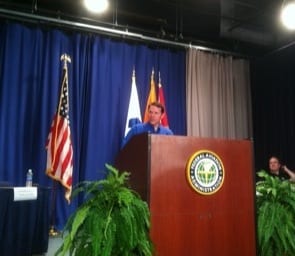This has actually been a banner year for general aviation, according to U.S. Rep. Sam Graves (R-Mo.), who hosted a Town Hall Meeting Saturday morning on the Sun ’n Fun campus. “We got a lot done in the FAA reauthorization,” he reported.

Among the victories were amendments that protect Through The Fence agreements — “I think local airports should be able to make those decisions themselves,” he said — as well as language that preserves and protects data on antique airplanes and makes it available to restorers and airplane owners.
“We also were able to keep user fees out of the FAA reauthorization,” Graves said. “That was the No. 1 thing we worked to keep out of the bill, but user fees reared their head in the budget.”
In his proposed budget, President Barack Obama has put forth a $100 per flight fee for aircraft. And while it exempts piston aircraft and those flown recreationally, the proposal still has GA advocates worried.

“It’s just for jets now, but in other countries whenever a user fee is enacted, it spread to all GA,” noted Craig Fuller, president of the Aircraft Owners and Pilots Association (AOPA). “Half of the members of Congress already sent a letter to the president saying no to user fees. They said ‘don’t even send it here, we won’t debate it.’”
Graves, who penned the letter with other members of the General Aviation Caucus in the Congress, notes that the administration is trying to sell user fees as going to fund the Next Generation Air Transportation System — the upgrading of the Air Traffic Control system — “but it isn’t,” he said. “It’s going right into the General Fund. It’s revenue mining.”
Graves noted the fight against user fees is a non-partisan issue, with most of Congress against them. “We are asking the president to drop user fees once and for all,” he said. “We do not want user fees in the U.S. It will destroy our industry.”
But what about paying our fair share?
AOPA’s Fuller noted that 2/3 of the FAA’s $16 billion budget is funded by people who use the air traffic control system — fees from passengers and airlines, and fuel taxes paid by general aviation pilots and the airlines. The remaining third comes from the General Fund.
“The entire nation benefits greatly by our air traffic control system, even for those people who never get on a plane,” he said.
He added that general aviation pilots have made it known that they are willing to pay higher fuel taxes — “if the money is used for aviation.”
Graves is also optimistic about another proposal before Congress called the Pilot’s Bill of Rights, introduced by Oklahoma Sen. James Inhofe last summer, while Graves introduced a similar proposal in the House.
The Bill of Rights covers a variety of issues very important to pilots, including giving pilots access to information that is being used in an investigation about them — “now that information is very hard to find,” Graves said.
It also would require the FAA to review its NOTAM program. “That information is also hard to get your hands on if they say you violated a FAR,” he said. “It’s hard to get a copy of a NOTAM afterwards.”
The bill also would make sure information gathered by contract control towers is made available to pilots. Now if you want that information, you have to file a subpoena.
Lastly, the Bill of Rights would require a review of the medical certification process. Graves wants to “move in the direction that gives the pilot the benefit of the doubt rather than being assumed guilty and having to prove your innocence.”
He added he hopes the Pilot’s Bill of Rights will get passed this year, noting that Inhofe already has a majority of the Senate — 60 of his colleagues — as co-sponsors of the bill.
During the question and answer period, one pilot asked about the AOPA/EAA request for an exemption to the third class medical for recreational pilots. While some pilots have complained that the request doesn’t go far enough, Fuller said the idea was to “approach the FAA with something they can say yes to.”
The exemption was submitted about 10 days ago, he said, noting, “we should know by the end of the year if we have a shot at it. There are some concerns in the medical community, which I respect. This is in no way a sure thing.”
People who read this article also read articles on airparks, airshow, airshows, avgas, aviation fuel, aviation news, aircraft owner, avionics, buy a plane, FAA, fly-in, flying, general aviation, learn to fly, pilots, Light-Sport Aircraft, LSA, and Sport Pilot.
